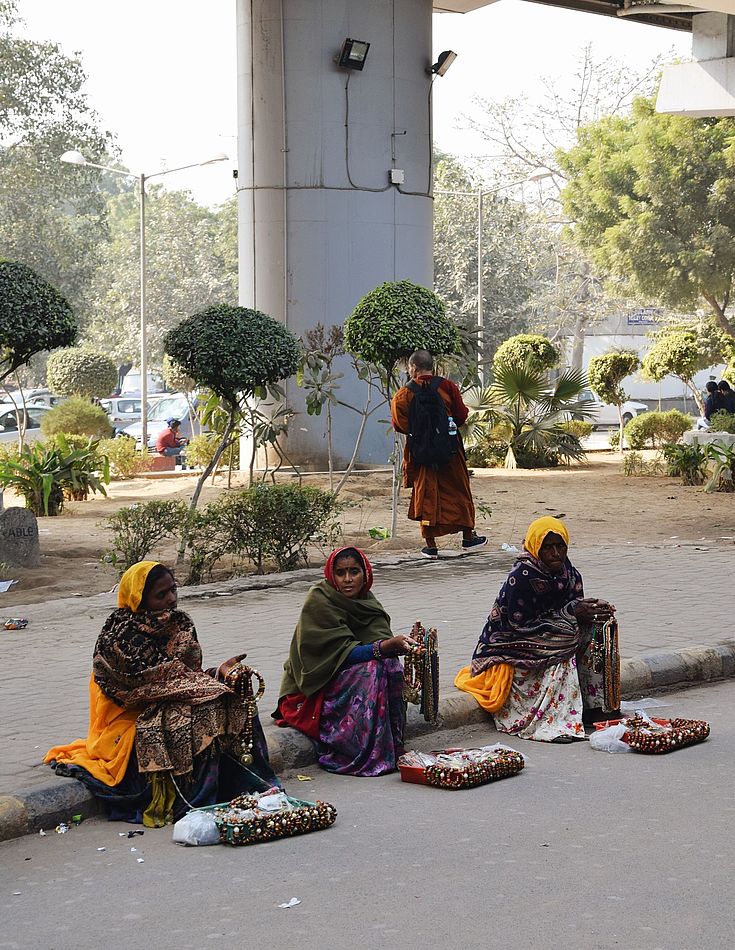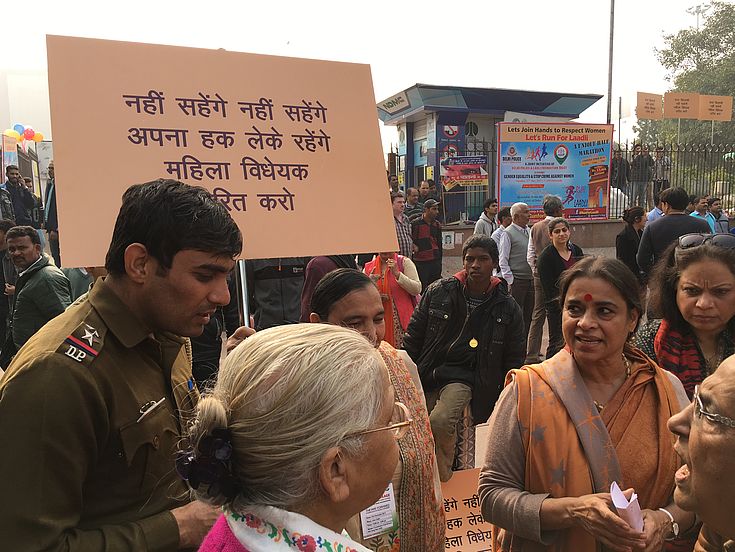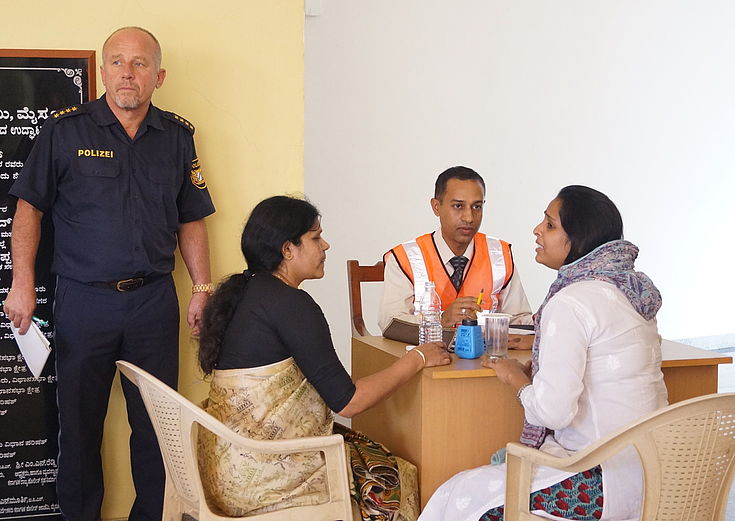Interview with HSS India's Resident Representative Volker L. Plän
Women in India - Small steps towards empowerment
This interview is a translation of the version initially published on the Foundation's German homepage on 12 December 2018 (https://www.hss.de/weltweit-aktiv/asien/artikel-detail-asien/frauen-in-indien-zwischen-emanzipation-und-tradition-news4024)

The role of women in India is controversial – On the one hand, there were and there are indeed strong women in society, on the other hand there is misogyny – unfortunately a part of daily life. In what way are women in India discriminated against?
Discrimination against women occurs in a rather subtle way in India, I would refrain from speaking of a systematic misogyny. Multiple campaigns and laws which protect and promote girls and women exist. The fact that women until today are disadvantaged in daily life is rather due to deeply rooted traditions, where the disadvantage is subtle but consequential. The prevalent family-oriented culture in India expects men and women to follow traditional roles: arranged marriages including dowry by the bride’s family, bearing children, preparing food for the entire family. The life of men is also non-self-determined – however the consequences for men are usually less distinct. As the woman is married into another family during the wedding and the payment of a dowry is required, even today they are a perceived as a burden from the moment of their birth in comparison to boys. This leads to consequences in everyday life. The numerous programmes by the government that promote, educate and protect do help, but they cannot permeate the patriarchal structure, which has been established over decades.
Women in India have many rights but also many duties: The Indian woman is supposed to be beautiful and educated, pursue a career, but at the same time not contradict the husband’s family should they demand her focus entirely on family life. The woman has one disadvantage already by being married into another family, where she is the “new one” and finds herself in an underprivileged situation. Even mothers or women in powerful positions seldom defend themselves against this mindset. The likely loss of reputation in a patriarchal society is too much of a risk. Women empowerment on a private level has therefore oftentimes a patronizing aftertaste. For instance, when husbands say, that they permit their wives to pursue a job. One cannot have the same expectations from Indian society as from that of emancipation in Germany. Here, small steps are already a success.

In recent years in India, laws for protecting women were legislated, women quotas in city councils and parliaments were introduced and a special deputy for families was appointed. Consequently, much has happened in theory. How is the situation in practice?
Many of the laws even date back to the 1960s. The legal situation of women in India is exemplary. Unfortunately, it turns out that increasingly severe penalties for sexual crimes cannot contain them. The implementation through judges, police, help desks and lawyers is oftentimes not as it was meant to be by the law. Besides, women are often not conscious of their rights. Our project work also displays, that even the responsible civil servants in the ministries, police and judges show large knowledge gaps when it comes to implementing laws, compensations and campaigns. Imagine you are repeatedly a victim of domestic violence and the help desk officer for women suggests you come to an arrangement with the offender instead of providing immediate protection through the legal system and the police.
Good laws are passed quickly but the underlying mechanisms and spreading the knowledge about their usage can take years. During our work in Pune, we time and again meet lawyers and judges who do not know the „Protection of Women from Domestic Violence Act” (of 2005). Compensations are fined but the payment is not executed, women’s shelters hardly exist. Moreover, there is the social stigma of the victim or the woman’s economic dependence on the husband, which keeps the victims from pressing criminal charges – here, even the best laws are powerless.

Has the quantity of rapes increased in India since 2012 or is it rather the case that it is increasingly covered in the media and charges are pressed more frequently in the case of rape, for which it appears more often in the statistics?
The urban, educated class is noticeably moved by the topic, for which they draw constant attention through protests. Also the media puts the spotlight increasingly on the matter since 2012 – nowadays rather due to dramaturgic than out of informative reasons. This obviously influences the perception. Experts assume that charges are pressed more often in cities in the case of rape, while the quantity of crimes remains at the same level. In international comparison, this level is relatively low, even when assuming that charges are pressed in less than 10% of rapes.
Therefore, there has certainly been progress since the brutal gang rape in Delhi in December 2012. The fact, that despite the media attention there has been no reduction in crimes, is however worrisome. Also, the intensity of criminal offences does not seem to lessen: gang rapes still occur (albeit few), the victims seem to be increasingly younger and many offences come along with mutilation, torture and manslaughter. All this contributes to an increasing sense of insecurity for women. In this case, statistics fail to put the mind at ease.

The HSS in India is active in the field of women empowerment. What goals does the foundation pursue?
As mentioned, the laws are already exemplary. We are now working to ensure that the entire chain of stakeholders also implements Indian law: more knowledge about specific laws, better cooperation between police, prosecutors, judges and NGOs. We also work together with the Bavarian police on a practice-oriented training of the police in Karnataka. This will help to prepare the police better for all kinds of missions – through better forensics and law enforcement in order to increase the chances of charges to be successful in court.
We cooperate with local partner organizations that specialize in legal support or in women empowerment; but also directly with the police of the state of Karnataka, the federal offices for women and children as well as the human rights commission. Ultimately, the entire Indian society and economy will benefit if women feel safer, trust the authorities and the Indian justice system gains greater credibility.
How important is it to involve men, especially those who function as a role model, in the promotion of equal rights?
Men must be involved at every level in every public discussion. Many women empowerment campaigns have been initiated by men. Meanwhile, it becomes apparent that the women’s movement is isolating itself. This may be partly due to pressure from the national and international community issuing increasingly strict laws in favor of women. No Indian law on sexual offenses is gender neutral. Now there are even pro-male movements in response.
I also do not see a party that supports women empowerment as a core message or which stands out due to special demands on this matter - despite female party leaders and ministers.
Next year, parliamentary elections will be held in India. The ratio of female delegates is very low. It is interesting to see, that the ratio of the women electorate is now as high as that of men. Parties have recognized women as voters and we will wait and see if this will be reflected in the electoral programs. Female candidates are few (about eight percent), but also this share is increasing - especially in areas where there are significantly fewer women in percentage terms. So maybe women will decide the next election?
